- Register
- Log in to Tune-In
- Wishlist (0)
-
Shopping cart
(0)
You have no items in your shopping cart.
Beatles News
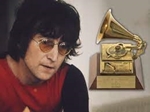
A rare piece of Beatles' history is hitting the auction block ... a Grammy given to John Lennon is expected to bring in a fortune -- so, something tells us if you wanna come together with this trophy, ya better be a multimillionaire.
Gotta Have Rock and Roll, the music memorabilia-based auction house, has a unique Grammy Trustee award given to John as one of its many new lots, and this golden trophy is estimated to make up to $500,000 when it closes next week.
John, Ringo Starr, George Harrison, and Paul McCartney were each given one of the pieces of golden glory in 1972 ... and the one up for auction initially went to John.

“Are you going to get a haircut at all while you’re here?” a reporter asked The Beatles during their first U.S. press conference at John F. Kennedy Airport in New York City on February 7, 1964. “Nope,” said Ringo Starr, followed by a “No, thanks” by Paul McCartney. George Harrison shared “No, I had one yesterday,” and John Lennon added a curt “Nope.”
The Beatles’ long hair caused bewilderment amongst the media and some public backlash by the early 1960s with kids often emulating the mop-top hairdo and facing the consequences at school and how long boys could wear their hair before being reprimanded.
When the Beatles first arrived in America in February of 1964, TIME magazine called their top halves “mushroom haircuts,” while Newsweek referred to them as “sheep-dog bangs.”
Source: Tina Benitez-Eves/americansongwriter.com
details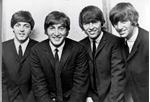
George Harrison and Ringo Starr spent time in the hospital as children. While there, both decided that they wanted to play instruments.
Each of The Beatles became interested in music at a young age. They obsessed over artists like Elvis Presley and began dedicating themselves to learning to play instruments. Both George Harrison and Ringo Starr became interested in playing music while in the hospital. They shared how their lengthy stays made them want to learn to play an instrument.
When Harrison was a preteen, he fell ill with kidney problems.
“I’d just left Dovedale Junior School and gone to the big school, the Liverpool Institute, when I went into hospital. I got sick when I was twelve or thirteen with kidney trouble,”,” he said in The Beatles Anthology, adding, “I always used to get tonsillitis; childhood illnesses. I had a really sore throat, and this one year the infection spread and gave me nephritis, an inflammation of the kidneys.”
Source: Emma McKee/cheatsheet.com
details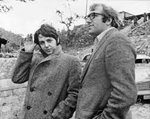
New bio 'Living The Beatles Legend: The Untold Story of Mal Evans' tells one of the the strangest stories in all of Beatles lore.
Before Peter Jackson’s epic film Get Back, only the most hardcore Beatles fans had any idea who Mal Evans was. But anyone who sees the movie has to come away in love with Mal. He’s the devoted Beatles roadie, one of the only trusted friends in their innermost circle. He’s a cheerful goofball with a jolly grin, banging the anvil when they play “Maxwell’s Silver Hammer.” The six-six giant who cleverly stalls the cops at the door, when they’re trying to shut down the rooftop performance. Their personal assistant, confidant, fixer, guardian angel. But then, just a few years later, in 1976, he’s in a drug-crazed rage, aiming a rifle at the L.A. cops, and gets gunned down. It’s one of the strangest stories in all of Beatles lore.
Source:Rob Sheffield/rollingstone.com
details
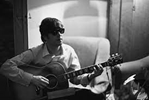
This John Lennon song was projected to become a No. 1 single. John and Yoko Ono had the same reaction to this news.
Yoko Ono hoped one of John Lennon‘s songs would hit No. 1 on the pop charts. Sadly, it reached that milestone after John’s tragic death. A reporter revealed what John was thinking in the final days of his life.
David Sheff famously interviewed John and Yoko Ono for Playboy in 1980. He wrote about the experience in a 2020 forward to the book All We Are Saying: The Last Major Interview with John Lennon and Yoko Ono. “I completed the interview in early September, and it was scheduled to be released in mid-December,” he said. “When, on December 6, [Playboy executive editor] Barry [Golson] got a hot-off-the-press advance copy of the magazine, he messengered it to The Dakota [Apartments, where John and Yoko lived].
“John and Yoko called me in Los Angeles the next day,” Sheff added. “Yoko was pleased with the interview, and she reported they were thrilled that the first single from Double Fantasy, ‘(Just Like) Starting Over,’ was projected to hit No. 1 on the record charts.”
Source:Matthew Trzcinski/cheatsheet.com

Kate Middleton wove emotional tributes into her Together At Christmas carol concert.
On Friday night, the Princess of Wales, 41, hosted the holiday service at Westminster Abbey for the third year in a row. This year's event featured a piece of pop music history in honor of John Lennon and George Michael.
During the program, U.K. radio host and mental health advocate Roman Kemp, 30, the son of pop stars Martin Kemp and Shirlie Holliman, introduced singer-songwriter Jacob Collier’s performance of “Last Christmas,” which he performed on a piano that originally belonged to Beatles frontman Lennon and was once owned by Michael.
“Last Christmas” was originally sung by Michael, Kemp’s late godfather, through his duo Wham! with Andrew Ridgeley in 1984. Michael died on Christmas Day in 2016, and his godson remembered him at Together At Christmas as a “a man of great kindness and compassion,” adding that he was there in “spirit.”
Source: Janine Henni/people.com
details
Philip Norman’s competent, professional and highly readable biography can only get so close to its subject
When George Harrison was seven years old, his mother took him on a visit to their Irish cousins in Dublin.
As the Liverpudlians strolled up O’Connell Street, their photograph was taken by Ukrainian immigrant Arthur Fields who snapped over 180,000 people there from the 1930s until his retirement in 1985. This particular image captured what was to become one of the world’s most famous faces, already looking sullen and suspicious.
Source: Andrew Lynch/businesspost.ie
details
The Jean Nicolas Lambert violin was signed by the pair in a Mallorca restaurant in 1971
A violin signed by John Lennon and Yoko Ono is up for auction on Catawiki, with the starting bid at €35,000.
The violin is owned by Spanish violinist and collector Jose Eugenio Sanz Sampedro, who bought the violin in Madrid in 1965. He worked in an orchestra at the Hotel Castillo Son Vida in Palma de Mallorca from 1970 to 1981.
In the auction item description, the violinist describes witnessing the pair being turned away from the hotel restaurant, as Lennon was not wearing a tie. Lennon later returned to the restaurant with a tie attached to his head, and was then admitted to the restaurant.
He approached Lennon and Ono’s table and performed ‘Yesterday’ for them. ’I asked John if he could sign an autograph for me on the violin which they both kindly did using a pen engraving the names into the wood.’The violin also holds signatures from German conductor James Last, and Carlos Arias Navarro: last Head of Government of Spain during the Franco dictatorship.
Source: thestrad.com
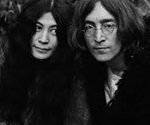
Outsiders accused John Lennon and Yoko Ono of not loving each other. John had plenty to say about the relationship himself.
Classic rock stars were the subject of every mean or ridiculous rumor imaginable. Outsiders accused John Lennon and Yoko Ono of not loving each other. A journalist who spoke with both of them refuted this idea. Furthermore, John had plenty to say about the situation himself.
David Sheff famously interviewed John for Playboy. His interview became the book All We Are Saying: The Last Major Interview with John Lennon and Yoko Ono. In 2020, he contributed an essay that discussed John and Yoko’s romance to a reprint of the book.
“Forty years after John’s death, his and Yoko’s relationship continues to be dissected, some claiming that the happiness John and Yoko showed to the world — to me — was a fiction,” he wrote. “It wasn’t. I witnessed the joy and love between them. I’ve never been with two people as obviously in love. They expressed it in words but also in the way they treated each other — the way they looked at each other.”
Source: Matthew Trzcinski/cheatsheet.com

John Lennon, the legendary Beatles member and one of the most influential musicians of all time, was assassinated 43 years ago on Dec. 8, 1980.
The British-born singer died at the age of 40 after being shot in front of his apartment building, The Dakota, in New York City.
The shooter was a deranged fan named Mark David Chapman, who fired four bullets from a .38-caliber revolver into Lennon's back and shoulder, hours after the rock star signed an autograph for him.
"I'm shot," Lennon said in his last words before collapsing on the ground, according to witnesses.
Prior to his death, Lennon and his wife Yoko Ono were returning to their apartment after a recording session. Chapman shot the singer at approximately 10:50 p.m. as he was walking through the entryway of The Dakota, according to The Associated Press.Less than 10 minutes later, Lennon was taken by a police car to Manhattan's Roosevelt Hospital, where he was pronounced dead upon arrival. New York City Medical Examiner Elliot Gross told The Washington Post Lennon was shot twice in the back and twice in the shoulder, and his cause of death was "massive hemorrhaging and shock."
Source: Ashley Hume/foxnews.com

Mark David Chapman's motives in fatally shooting John Lennon are explained in the Apple TV+ docuseries.
"John Lennon: Murder Without a Trial" looks at why Chapman decided to murder Beatle Lennon. Interviews with Chapman's defense lawyer David Suggs and Dr. Naomi Goldstein, the psychiatrist who assessed Chapman, give new insights into his state of mind at the time of the 1980 killing.
The docuseries features exclusive eyewitness interviews and previously unseen crime scene photos, shedding new light on the life and murder of Lennon, and the investigation and conviction of Chapman, his confessed killer.
A witness to Lennon's murder, cabdriver Richard Peterson, and Jay Hastings, a doorman at the Dakota who heard Lennon's last words before he was shot outside the building, also speculate what compelled Chapman to kill.
The docuseries, narrated by Kiefer Sutherland, also explores the immediate outpouring of grief that greeted reports of Lennon's death, including fans gathering in front of Lennon and Yoko Ono's home.
Source: startribune.com
details
Disney+ Brazil announced that they will broadcast Paul McCartney's final 'Got Back' gig from Brazil on December 16.
Paul McCartney will get to showcase his final “Got Back” tour show in front of a huge crowd. Disney+ will once again broadcast a legendary rocker's concert.
Disney+ Brazil announced that McCartney's final “Got Back” tour show on December 16 will be broadcast on the streaming service and Star+.
“We brought Paul McCartney's farewell tour live for you,” the X post began. “Paul McCartney: Got Back, live from Maracanã, on December 165h, at 9:15 pm.”
Source: Andrew Korpan/clutchpoints.com
details
While The Beatles' "Hey Jude" and Queen's "Bohemian Rhapsody" sound so different from each other, they have a major similarity. They also share a connection to a David Bowie song.
The Beatles‘ “Hey Jude” is arguably the Fab Four’s signature song and Queen’s “Bohemian Rhapsody” is undeniably Queen’s signature song. While the two hits sound so different from each other, they have a major similarity. The tunes also have something in common with David Bowie’s “Life on Mars?”
According to Rolling Stone, Paul McCartney played the Bechstein piano at London’s Trident Studios on “Hey Jude.” That piano has had quite a history! It was also used on Queen’s “Bohemian Rhapsody,” Bowie’s “Life on Mars?,” and Elton John’s “Levon.”
The two bands used that piano in wildly different ways. In “Hey Jude,” it sounds warm and inviting, like the tune as a whole. In contrast, the piano riffs in “Bohemian Rhapsody” sound nervous, desperate, and sad. They fit with the song’s theme of murder.
Source: Matthew Trzcinski/cheatsheet.com

For years, it seemed inconceivable that we would ever hear a new song from The Beatles, following the deaths of John Lennon and George Harrison in 1980 and 2001 respectively.
But 43 after Lennon’s death, and more than two decades on from Harrison’s passing, the seemingly impossible happened in November 2023 – the release of a new Beatles song.
The Fab Four were reunited for what has been described as their final new song together, entitled Now and Then.
Now and Then was initially written and recorded by John Lennon in the 1970s and later developed by other band members in 1995, but limited technology meant they were unhappy with the sound quality.
However, AI technology pioneered by Peter Jackson enabled Sir Paul McCartney and Sir Ringo Starr to lift Lennon's voice from the demo and turn it into a song featuring all four members.
The farewell song was accompanied by a Jackson-led music video as well as a 12-minute documentary film written and directed by Oliver Murray, featuring exclusive footage and commentary from Paul, Ringo, George, Sean Ono Lennon and Jackson.
If the release of Now and Then has left you wanting to take a deep dive into the band’s disco details

If the fundamental measure of a documentary series is how many first-hand witnesses it can recruit, John Lennon: Murder Without a Trial is unimpeachable. This three-parter has almost everyone you could ask for, apart from Yoko Ono, as it reviews the day Lennon was shot dead by Mark Chapman, in New York on 8 December 1980, and the legal investigation that followed. What it can’t control is how much of interest those people have to say – because, however much we might expect the killing of a Beatle to be a fascinating story with a hive of secrets beneath the surface, this is a sad but simple tale.
By far the strongest episode of the three is the first, concerning the killing itself. Chapman shot Lennon after watching him leave the apartment block where he lived, the Dakota building overlooking Central Park, then waiting for him to return after a trip to the recording studio. Murder Without a Trial talks to the Dakota’s security guard, who speaks for the first time, and the building’s porter. It also talks to a taxi driver who witnessed the attack, the radio journalist who conducted Lennon’s last interview earlier in the day, the producer who had overseen Lennon’s last work, the NYPD&rsq details
